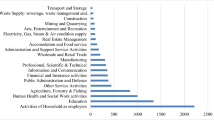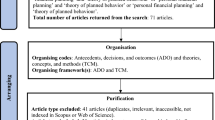Abstract
The issue of employability remains a major challenge in develo** countries. This article studies the effects of financial inclusion on employability in a sample of 32 sub-Saharan African countries. The methodological approach mobilizes fuzzy set theory and binary probit modelling. The robustness of the results is alternatively checked by a Multiple Correspondence Analysis on the variables used to construct the multidimensional index of financial inclusion. The results highlight an overall financial inclusion index of 29.35% in the sample. They further show that financial inclusion improves employability in sub-Saharan Africa. An increase in the degree of financial inclusion by 10 percentage points leads to an increase in the probability of having a job by 4.4 percentage points. Account ownership in a financial institution, mobile money account ownership, savings, and access to borrowing are the main financial inclusion variables that positively affect employability in sub-Saharan Africa. In terms of the implications of economic policies, public authorities should take measures aimed at the financial inclusion of populations by promoting their access to financial services and electronic means of payment.

Source: Authors based on Probit model estimates
Similar content being viewed by others
Data availability statement
All codes are written in STATA and are available from the corresponding author on request.
References
Bauchet J, Marshall C, Starita L, Thomas J, Yalouris A (2011) Latest findings from randomized evaluations of microfinance. FORUM; n°. 2. World Bank, Washington, DC. World Bank. https://openknowledge.worldbank.org/handle/10986/26892
Beck T, Demirgüç-Kunt A, Levine R (2009) Financial institutions and markets across countries and over time-data and analysis. World Bank policy research working paper, (4943). https://papers.ssrn.com/sol3/papers.cfm?abstract_id=1414705
Bouchama N, Ferrant G, Fuiret L, Meneses A, Thim A (2018) Les inégalités de genre dans les institutions sociales ouest-africaines, Notes ouest-africaines. n°13. Paris: Editions OCDE. https://ideas.repec.org/p/oec/swacab/13-fr.html
Bruhn M, Love I (2014) The real impact of improved access to finance: evidence from Mexico. J Financ 69(3):1347–1376. https://doi.org/10.1111/jofi.12091
Burgess PL, Kingston JL (1976) The impact of unemployment insurance benefits on reemployment success. Ind Labor Relat Rev 30(1):25–30. https://doi.org/10.1177/001979397603000102
Cerioli A, Zani S (1990) A fuzzy approach to the measurement of poverty. In: Income and wealth distribution, inequality and poverty. Springer, Berlin, Heidelberg. pp. 272–284. https://doi.org/10.1007/978-3-642-84250-4_18
Chabou OI (2019) Rôle de la microfinance dans l’inclusion financière des pays de l’UEMOA: application au cas du Niger. Doctoral dissertation, Université de Rouen-Normandie. https://core.ac.uk/download/pdf/265353845.pdf
Cull R, Ehrbeck T, Holle N (2014) Financial inclusion and development: Recent impact evidence.The World Bank, n°. 88169, pp. 1–12
Dagum C, Slottje DJ (2000) A new method to estimate the level and distribution of household human capital with application. Struct Chang Econ Dyn 11(1–2):67–94. https://doi.org/10.1016/S0954-349X(00)00022-9
Demirgü K, Klapper LF (2012) Financial inclusion in Africa: an overview. World Bank Policy Research Working Paper, (6088). https://papers.ssrn.com/sol3/papers.cfm?abstract_id=2084599
Beck T, Demirgüç-Kunt A, Levine R (2007) Finance, inequality and the poor. J Econ Growth 12(1):27–49. https://doi.org/10.1007/s10887-007-9010-6
Demirguç-Kunt A, Klapper LF (2013) World bankmeasuring financial inclusion: explaining variation in use of financial services across and within countries. Brookings papers on economic activity. Brookings Institution Press 1:279–340. https://doi.org/10.1353/eca.2013.0002
Demirgüc-Kunt A, Klapper L (2013) Financial inclusion and legal discrimination against women: evidence from develo** countries. World Bank Policy Research Working Paper, n° 6416. https://ssrn.com/abstract=2254240
Bouchon-Meunier B, Dubois D, Godo L, Prade H (1999) Fuzzy sets and possibility theory in approximate and plausible reasoning. In: Fuzzy sets in approximate reasoning and information systems. Springer, Boston, MA. pp. 15–190 DOI: https://doi.org/10.1007/978-1-4615-5243-7_2
Ehrenger R, Oaxaca RL (1976) Unemployment insurance, duration of unemployment, and subsequent wage gain. American Economic Review 66(5):754–766
Guérineau S, Jacolin L (2014) L’inclusion financière en Afrique Subsaharienne: Faits stylisés et déterminants. Revue D’économie Financière 4(116):57–80. https://doi.org/10.3917/ecofi.116.0057
Koker L, Jentzsc HN (2013) Financial inclusion and financial integrity: Aligned incentives? World Dev 4:267–280. https://doi.org/10.1016/j.worlddev.2012.11.002
Laroche M, Mérette M, Ruggeri GC (1999) On the concept and dimensions of human capital in a knowledge-based economy context. Canadian Public Policy/analyse De Politiques 25(1):87–100. https://doi.org/10.2307/3551403
Li L (2018) Financial inclusion and poverty: The role of relative income. China Econ Rev 52:165–191. https://doi.org/10.1016/j.chieco.2018.07.006
Molefhi, K. (2019) Financial Inclusion and its Impact on Employment Creation in Botswana. BIDPA Working Paper, n°60, p.28. https://www.africaportal.org/publications/financial-inclusion-and-its-impact-employment-creation-botswana/
Mugo M, Kilonzo E (2017) Community—level impacts of financial inclusion in kenya with particular focus on poverty eradication and employment creation. Central Bank of Kenya, 13. https://www.un.org/development/desa/dspd/wp-content/uploads/sites/22/2017/04/Matu-Mugo-and-Evelyne-Kilonzo-UN-SDGs-Paper5May2017-Kenya-Financial-Inclusion.pdf
N'dri L, Kakinaka M (2020) Financial inclusion, mobile money, and individual welfare: The case of Burkina Faso. Telecommunications Policy, 44 (3), 101926. https://doi.org/10.1016/j.telpol.2020.101926
Nikiéma PR, Bado B (2020) Analyse des déterminants socioéconomiques de l’inclusion financière au Burkina Faso. Ann. Univ. Lomé, série Sc. Eco. Et Gest, XVI, pp 14–28. https://www.researchgate.net/publication/345770334_Analyse_des_determinants_socioeconomiques_de_l'inclusion_financiere_au_Burkina_Faso
Osikena J, Uğur K (2016) Enterprising Africa What role can financial inclusion play in driving employment-led growth?The Foreign Policy Centre, London, United Kingdom. https://www.files.ethz.ch/isn/195955/1725.pdf
Tangakou SR (2019) L’inclusion Financiere Et Le Paiement Mobile En Zone CEMAC. European Scientific Journal, ESJ, 15 (7), 101. https://doi.org/10.19044/esj.2019.v15n7p101
Zadeh LA (1965) Fuzzy Sets Information and Control 8(3):338–353. https://doi.org/10.1016/S0019-9958(65)90241-X
Zulfigar K, Chaudhari M, Aslam A (2016) Financial inclusion and implications for inclusive growth. Pakistan Pakistan Econ Soc Rev 54(2):297–325
Acknowledgements
Our thanks go to all those of goodwill who have devoted their time to proofreading the article.
Funding
This article was not funded by any project grant.
Author information
Authors and Affiliations
Contributions
The authors worked jointly on this article and both authors contributed equally to the design of the article. Both authors have read and approved the final manuscript. Author contact details: The first author of the article is a lecturer at Institute for Training and Professional Development (IFPM) at the University of Ouahigouya; and the second author is a Doctor of economics at the University of Thomas Sankara and a statistician-economist engineer at the Directorate of Statistics of the Ministry in charge of agriculture.
Corresponding author
Ethics declarations
Conflict of interest
The authors declare that they have no competing interests.
Ethical approval
This article does not contain any studies with human participants or animals performed by any of the authors.
Consent for publication
Springer Nature or its licensor holds exclusive rights to this article under a publishing agreement with the author(s) or other rightsholder(s); author self-archiving of the accepted manuscript version of this article is solely governed by the terms of such publishing agreement and applicable law.
Rights and permissions
Springer Nature or its licensor (e.g. a society or other partner) holds exclusive rights to this article under a publishing agreement with the author(s) or other rightsholder(s); author self-archiving of the accepted manuscript version of this article is solely governed by the terms of such publishing agreement and applicable law.
About this article
Cite this article
Tiatité, N., Adama, N. Effects of financial inclusion on employability in sub-Saharan Africa: a fuzzy set theory analysis. SN Bus Econ 2, 196 (2022). https://doi.org/10.1007/s43546-022-00378-0
Received:
Accepted:
Published:
DOI: https://doi.org/10.1007/s43546-022-00378-0




